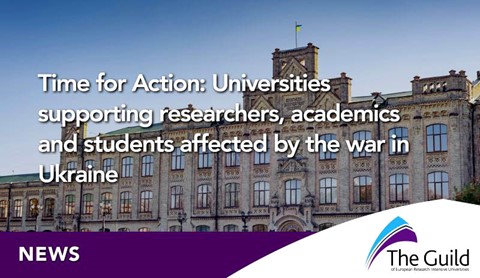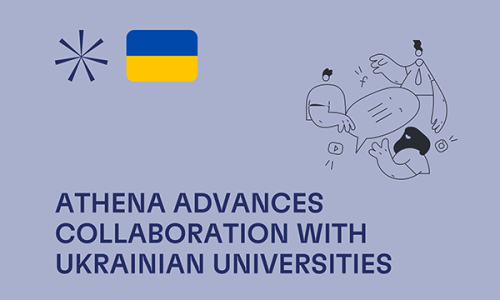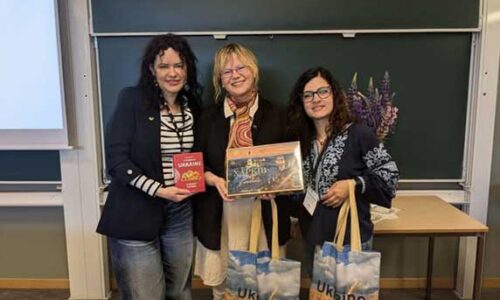
The Guild of European Research-Intensive Universities Supports Ukrainian Researchers, Academics and Students
In response to the war in Ukraine and the arrival of students and staff to Europe’s universities, The Guild calls on the European Commission and the French Presidency of the Council to demonstrate solidarity and the added value of a common European approach to the crisis.
The Guild universities are currently providing concrete support to enable researchers, academics, university staff and students to continue their lives, work, and careers to the best of their ability. Universities are suspending or changing regulations where necessary, making available scholarships, and developing a variety of support mechanisms (language courses, psychological support, employment opportunities within and beyond the university etc).
We welcome the European Commission’s commitment to support the continued participation of Ukraine and Ukrainian organisations in Horizon Europe, and to protect students from Ukraine studying at European universities. However, more should be done to enable universities to support students and staff from Ukraine on our campuses.
We invite policymakers to implement immediate and long-term measures by making the best use of national and EU instruments:
1. Facilitation of integration of staff and students at universities
We urge governments to do everything they can to facilitate the integration of staff and students at universities in a timely and flexible manner.
2. Designation of students and staff
It is extremely important to ensure that all provisions affect students and staff from Ukraine – not just Ukrainian citizens. Ukraine was home to more than 76,000 foreign students, , alongside staff of non-Ukrainian nationality. They need to be protected and welcomed at European universities, just as Ukrainian citizens.
- Ease the Erasmus+ rules in order to:
- Enable universities to mobilise unused Erasmus+ 2019 and 2020 funds (where possible) to support incoming students from Ukraine, without expecting them to earn any credit points. Students should be accepted through a light-touch procedure at the host university’s discretion. The same opportunities should be provided for academic and administrative staff members with maximum flexibility.
- Extend all current Erasmus+ funding for students from Ukraine into the next academic year, if this is desired by the students. Existing Inter-Institutional Agreements should be extended automatically.
- Create new Erasmus+ grants for students from Ukraine, allowing them to be supported for one year as exchange students. This would ensure that students can continue their studies as seamlessly as possible, allowing them to return as soon as possible to their home universities.
4. Admission requirements and fees
Universities are trying to be as flexible as they can in suspending student fees, or postponing fee payments. In many instances they need national government support and additional funding to do this on a sustainable basis. They are also changing deadlines for incoming students for the next 2022/23 academic year as much as they can. For that reason, national regulations about admissions procedures and deadlines should be suspended or made flexible to account for the needs of students from Ukraine.
5. MSCA Hop-On Grants
The Hop-On Facility under the Widening Participation part of Horizon Europe, designed to include researchers from Widening countries who were not part of the initial funding application, could be used for researchers from Ukraine within the MSCA.
6. Professions
Particular challenges persist in the admission of students studying for professional degrees, e.g. medicine. Here flexibility will be most difficult to achieve, but we nonetheless urge greatest possible flexibility (and support in the provision of places) as these professional skills will be most urgently needed in the reconstruction of Ukraine.
7. Funding support for Researchers at Risk
We advocate the mobilisation of additional funding for the creation of new mechanisms to support researchers from Ukraine, and other nations, who are not able to continue their research at home.
These need to be sufficiently rapid and flexible to account for the unplanned and urgent nature of arrivals from Ukraine. We propose a number of measures, catering for various research career stages:
- Flexible institutional funding: Funding could be distributed to either universities directly or via national agencies. This would allow institutions to declare what they can offer to researchers at risk and estimate what support they need. Due to the unplanned nature of the arrival from Ukraine, this funding could include budget items not normally part of research funding to assist their establishment and integration, and could include accommodation for the first few months or childcare costs for 1 -2 months etc.
- Extension of time-based eligibility criteria: ERC Starting and Consolidator Awards and MSCA Doctoral fellows include eligibility criteria on number of years since completion of PhD. The ERC and MSCA schemes already offer eligible extension criteria (e.g. maternity/paternity leave, long-term sick etc). We suggest that all researchers affiliated to Ukrainian universities be offered an extension period of, for example, one year.
- Create an emergency fellowship scheme: A dedicated fellowship scheme for academics and researchers unable to carry out research at home. Furthermore, additional places could be created for scholars at risk on MSCA Doctoral Networks.
- Using Hop-On Facility provided for Widening Participation: We advocate the use of the HopOn Facility under Horizon Europe, designed for researchers from Widening countries.
8. Families and Dependents
Some students’ and staff families are arriving at our universities, but (not yet) the students themselves – where this is the case, they also require support.
Source: https://www.the-guild.eu/news/2022/the-guild-statement-on-ukraine-and-eu-support_21-march-2022.pdf





